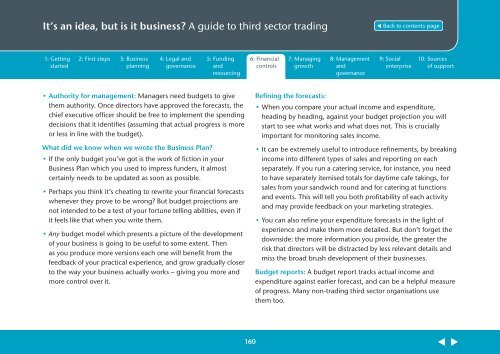A guide to third sector trading - WCVA
A guide to third sector trading - WCVA
A guide to third sector trading - WCVA
You also want an ePaper? Increase the reach of your titles
YUMPU automatically turns print PDFs into web optimized ePapers that Google loves.
It’s an idea, but is it business? A <strong>guide</strong> <strong>to</strong> <strong>third</strong> sec<strong>to</strong>r <strong>trading</strong><br />
1: Getting<br />
started<br />
2: First steps 3: Business<br />
planning<br />
4: Legal and<br />
governance<br />
5: Funding<br />
and<br />
resourcing<br />
6: Financial<br />
controls<br />
7: Managing<br />
growth<br />
8: Management<br />
and<br />
governance<br />
9: Social<br />
enterprise<br />
10: Sources<br />
of support<br />
• Authority for management: Managers need budgets <strong>to</strong> give<br />
them authority. Once direc<strong>to</strong>rs have approved the forecasts, the<br />
chief executive officer should be free <strong>to</strong> implement the spending<br />
decisions that it identifies (assuming that actual progress is more<br />
or less in line with the budget).<br />
What did we know when we wrote the Business Plan?<br />
• If the only budget you’ve got is the work of fiction in your<br />
Business Plan which you used <strong>to</strong> impress funders, it almost<br />
certainly needs <strong>to</strong> be updated as soon as possible.<br />
• Perhaps you think it’s cheating <strong>to</strong> rewrite your financial forecasts<br />
whenever they prove <strong>to</strong> be wrong? But budget projections are<br />
not intended <strong>to</strong> be a test of your fortune telling abilities, even if<br />
it feels like that when you write them.<br />
• Any budget model which presents a picture of the development<br />
of your business is going <strong>to</strong> be useful <strong>to</strong> some extent. Then<br />
as you produce more versions each one will benefit from the<br />
feedback of your practical experience, and grow gradually closer<br />
<strong>to</strong> the way your business actually works – giving you more and<br />
more control over it.<br />
Refining the forecasts:<br />
• When you compare your actual income and expenditure,<br />
heading by heading, against your budget projection you will<br />
start <strong>to</strong> see what works and what does not. This is crucially<br />
important for moni<strong>to</strong>ring sales income.<br />
• It can be extremely useful <strong>to</strong> introduce refinements, by breaking<br />
income in<strong>to</strong> different types of sales and reporting on each<br />
separately. If you run a catering service, for instance, you need<br />
<strong>to</strong> have separately itemised <strong>to</strong>tals for daytime cafe takings, for<br />
sales from your sandwich round and for catering at functions<br />
and events. This will tell you both profitability of each activity<br />
and may provide feedback on your marketing strategies.<br />
• You can also refine your expenditure forecasts in the light of<br />
experience and make them more detailed. But don’t forget the<br />
downside: the more information you provide, the greater the<br />
risk that direc<strong>to</strong>rs will be distracted by less relevant details and<br />
miss the broad brush development of their businesses.<br />
Budget reports: A budget report tracks actual income and<br />
expenditure against earlier forecast, and can be a helpful measure<br />
of progress. Many non-<strong>trading</strong> <strong>third</strong> sec<strong>to</strong>r organisations use<br />
them <strong>to</strong>o.<br />
160












